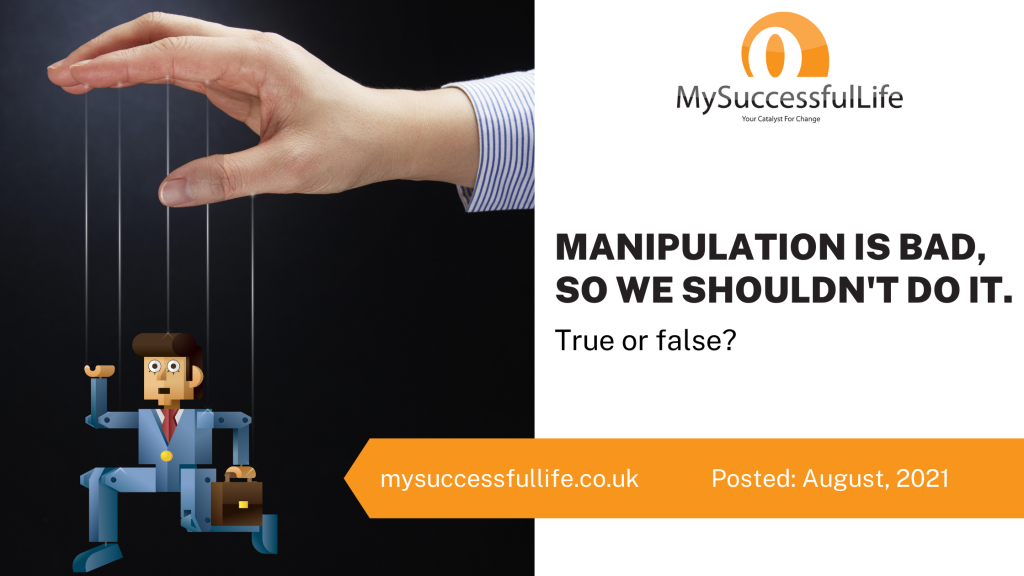Manipulation is Bad, so we Shouldn’t do it. True or False?

There’s lots of talk about manipulating people, how bad it is & how we should never do it.
The problem is, the people that say this are often the worst offenders and manipulate all of the time without even knowing it!
You see we are born manipulators and by the time we reach adulthood we are expert at it.
A baby realises quite quickly that if it cries in a particular way it gets fed, or changed or put to bed.
As the baby turns into a toddler it begins to experiment with other ways to manipulate its parents to get what it wants. It tries the two-year-old tantrum lying on the floor screaming, if that doesn’t work, our darling toddler resorts to the doughey eyed “oooh mummy I love you” look, you know that look, the one that parents can’t resist!
As the toddler works out which strategy works best to manipulate its parent it begins to use those manipulation strategies more and more. The parent learns and the parent adapts… And so as the toddler grows and turns into a teenager the teenager adapts its manipulation strategies too.
In an attempt to get what the teenager wants the use of classic “It’s not fair, all of my friends have got one!” manipulation strategy gets used – and if you have kids I’m sure you can think of many others.
By the time our stroppy teenager has turned into adult it has become a master manipulator. Our adult can now manipulate without even thinking about it, and therein lay the problem!
The manipulation strategies we use as adults may be more subtle, but they are there:
- That knowing look you give your assistant over the top of your glasses when they ask you a dumb question.
- The obtuse reply you give someone when you want to tell them you disapprove.
- When you ignore a comment completely.
The problem is, we cannot not communicate.
It’s absolutely impossible to not communicate anything at all. Even the act of ignoring someone and not speaking or messaging, is still communicating (I’ll leave you to decide what it communicates) and is still manipulating.
The cleverer person amongst us realises that.
They realise that they accidentally manipulate situations all day long.
They become aware of how they communicate, they become tuned in to the other person, realising that they have accidentally manipulated the other person, they then adapt their communication strategy to communicate their true intention without manipulating at all.
So is this person manipulating? Well, yes… It’s inevitable, it’s what we all do, the difference is that they are manipulating the conversation with positive intention to allow the other person to understand the true intention, and to communicate in a way that makes sense to the other person. It’s a complete win/win.
It’s what the expert communicators do without even thinking. Some people have learned the knack of doing this implicitly, all we are doing is making their unconscious, conscious.
So which do you choose? Conscious Competence, where you are aware of how you communicate, the problems you can accidentally bring about and are actively working to make a difference to communicate better… or do you wish to stay completely in the dark, ignoring the fact you do it and remain unconsciously incompetent?


